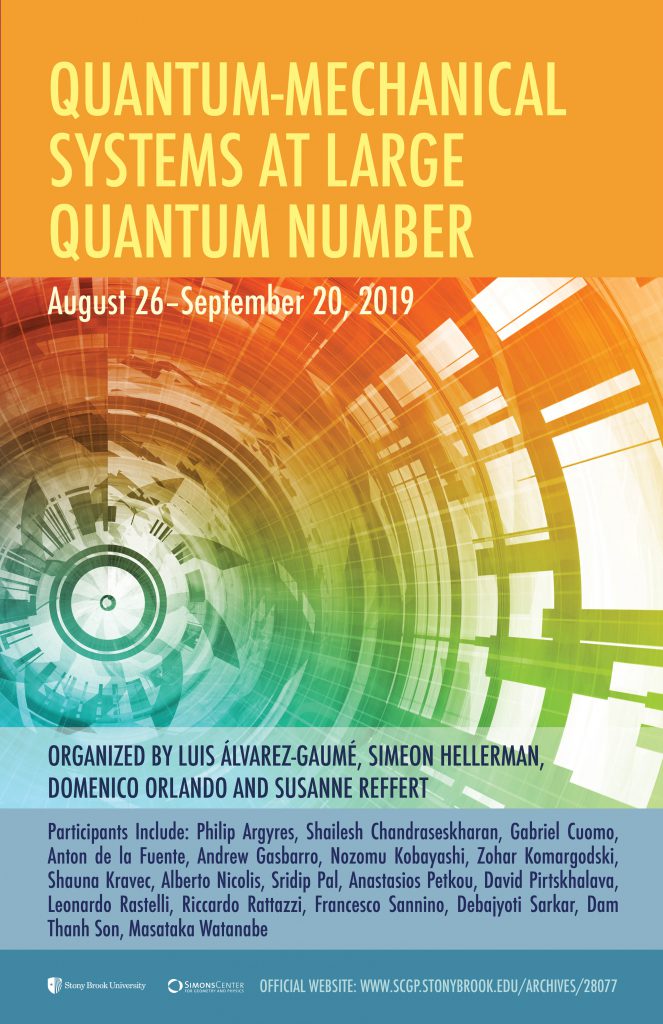Organized by: Luis Alvarez-Gaume, Simeon Hellerman, Domenico Orlando, and Susanne Reffert
QFT is the basic paradigm for the description of condensed matter physics and high-energy particle physics. Despite decades of research, strongly coupled regimes of QFT are largely inaccessible to analytic methods, even though important progress has come from the conformal bootstrap and non-Lagrangian methods.
This program will be dedicated to exploring the asymptotic directions of the space of amplitudes in strongly coupled QFT, particularly the case of large quantum number under an internal and/or rotational symmetry. We will make use of many different methods to explore such limits, including the conformal bootstrap, Monte Carlo simulations, supersymmetric localization and recursion relations, and the most recently-applied method, the use of effective field theories that describe the large-charge limit of strongly interacting systems, with
the total charge as a loop-suppressing parameter. Working in sectors of large global charge allows us to perform a perturbative expansion for strongly coupled theories without any small parameters, with the
inverse of the total charge itself, as the perturbation parameter suppressing quantum fluctuations and unknown terms in the effective action.
Another aim of the program is to better understand the connections between the different approaches to large quantum number physics that are emerging. In particular understanding the connection between the study of systems at large spin via the light-cone bootstrap and the large-charge approach would be of major importance.
The study of the large-quantum-number regime is a subject still in its infancy, with a number of rapidly developing directions and applications. Apart from the issues explicitly mentioned here, the LQN expansion appears to be a special case of a more general set of phenomena in which strongly coupled systems self-classicalize in various limits of “observable space”. Such examples include resurgence theory, Regge theory, supersymmetric localization, and the macroscopic limit of quantum thermodynamics. A key goal of the program is to discover the most natural context containing the large quantum-number expansion in its current form.
We hope that this program aimed to develop these connections and applications will meet with wide interest!
Schedule of Talks: All talks will take place in room 313. Videos can be found here: https://scgp.stonybrook.edu/video/results.php?event_id=275
| Monday 8/26 | 2:00pm | Simeon Hellerman | Large quantum numnber: Pverview and some recent developments |
| Tuesday 8/27 | 10:00am | Domenico Orlando | Large charge at large N |
| Wednesday 8/28 | 11:00am | Nozomu Kobayashi | Towards a C-theorem in defect CFT |
| Tuesday 9/3 | 11:00am | Shailesh Chadrasekharan | Monte Carlo calculations of conformal dimensions of large charge operators |
| Tuesday 9/3 | 2:30pm | Philip Argyres | |
| Wednesday 9/4 | 11:00am | Riccardo Rattazzi | |
| Thursday 9/5 | 11:00am | Francesco Sannino | Safe Interactions Guaranteed: New directions |
| Friday 9/6 | 11:00am | Zohar Komargodski | Large-Charge/Random-Matrix Duality |
| Monday 9/9 | 2:00pm | Gabriel Cuomo | Superfluids, vortices and spinning charged operators in CFTs |
| Tuesday 9/10 | 10:00am | Andrew Gasbarro | Curved Lattice Field Theory for CFT Data |
| Wednesday 9/11 | 11:00am | Shauna Kravec | The Large Charge Expansion for Non-Relativistic CFTs |
| Thursday 9/12 | 11:00am | Dalimil Mazac | Sphere Packing and Quantum Gravity |
| Thursday 9/12 | 1:00pm | Alberto Nicolis | Spontaneously broken boosts and the Goldstone continuum |
| Friday 9/13 | 11:00am | Masataka Watanabe | Chern-Simons-matter theory at Large Charge |
| Tuesday 9/17 | 10:00am | Sridip Pal | Asymptotics in 2D CFT and Tauberian Theorems |
| Thursday 9/19 | 3:30pm | David Pirtskhalava | Field Theory for Quantum Matter in Dwarf Stars |
| Friday 9/20 | 11:00am | Anton de la Fuente |


